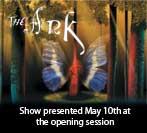Congress Activities
Congress activities will center on one of the three cross-cutting questions.
The Congress-Space
“Hyper-space” is an ecological concept that refers to all of the niches or functions occupied by the various species within an ecosystem. In a similar sense, the Congress-Space will serve as the main hub of activity for the 5th World Environmental Education Congress. Five types of activities will take place there.
These will explore the three cross-cutting questions of the Congress.
1. Keynote conferences
Renowned speakers will speak to the theme of “Earth, our common home” and propose answers to three cross-cutting questions that underpin all Congress activities.
2. Thematic niches
The Congress-Space will feature a number of thematic niches. Based on a participatory approach, responsibility for each of these niches will be entrusted to a team of partners interested in playing an active role in the organization of the Congress. Each niche is dedicated to a specific theme and will include a series of presentations, round table discussions, poster sessions, workshops and other activities (see Types of presentation). These niches will serve as forums for discussion, information sharing and constructing responses to the three cross-cutting questions of the Congress.
3. Symposia
Through symposia, specific themes or issues will be addressed:
- Methodology and Pedagogy: Exploring Current Directions in Environmental Education Research
Research is vital to both the theoretical and practical development of this field, and relevant to all congress strands. This symposium will examine cutting-edge research practices and new knowledge being generated through research. Participants are also asked to respond to one or more of the three congress questions.
Chair of symposium: Leesa Fawcett, York University, Canada -
The Whys of Evaluation
Evaluation is often undervalued at environmental education conferences, yet it is vital to know how we are doing. In this symposium, participants are invited to reflect on approaches to evaluation and discuss both contemporary issues and current findings. It is also important to illuminate limitations in our conceptions of evaluation, and how we can evaluate responses to one or more the three congress questions.
Chairs of symposium: Joe E Heimlich, Ohio State University, and Ginger Potter, Environmental Protection Agency, USA - Scientific and Environmental Education
Close links have been forged between scientific and environmental education. Some authors have simply combined these two fields into a classical approach, while others advocate renewed epistemological scientific positions and practices for environmental education. This conjunction of scientific and environmental education is a key issue at a time when the sciences – contributing to economic growth - have injected life into an industrial logic and emerging transborder risks. How then should scientific education position itself epistemologically, ethically and practically to nourish a reflexive and sociocritical identity in the face of environmental issues? How can we initiate an education of “knowledge dialogues” that generate principles, educational practices and policies of solidarity and social justice? These questions and others will be addressed at the Symposium, through presentations of the most recent research in the field.
Chairs of symposium: Barbara Bader, Laval University, Canada and Yves Girault, Muséum d'Histoire naturelle de Paris, France
-
Environmental Education in the Circumpolar World: Making Connections
Canada is a circumpolar nation and participant in International Polar Year research and celebrations. This symposium provides an opportunity for environmental educators from circumpolar nations to meet and discuss their work (all strands), and to bring circumpolar perspectives into the Congress. But this is also an important opportunity to initiate and foster North-South dialogues around one or more of the three Congress questions.Chair of Symposium: Remy Rodden, Government of the Yukon, Canada
-
Innovative Learning about Wildlife Biodiversity: The Canadian Wildlife Federation Learning Institute
Education and research have the potential to engage both the general public and government policy makers in a better understanding of one of the key indicators of environmental change, wildlife biodiversity, and of the importance of wildlife conservation. What is the current state of wildlife education, and how can we make better use of innovative learning models to transform people’s relationship with wildlife? This symposium will integrate results of a major on-line survey with innovative conversation sessions to be held at the Sponsor Presentations venue during the Congress. The panelists will lead symposium participants in lively conversation to advance research on innovative learning about wildlife biodiversity.Chair of Symposium: Dr. Grant A. Gardner, Institute Fellow, Canadian Wildlife Federation Learning Institute; Associate Vice-President (Academic), Memorial University
4. Political Forum
Conducted in panel format, this forum will focus on one of the three cross-cutting questions of the Congress, namely: How can environmental education influence public policies? More specifically, how can it prepare citizens to participate in public affairs and exercise a political role? How, in turn, can public policies foster the development of environmental education?
Five panels will bring together figures from various spheres of responsibility to debate this question through brief presentations and discussions with participants:
- Major international organizations to support environmental education;
- The national government agencies as levers of environmental education;
- City’s leadership in environmental education;
- Universities, more specifically departments of education science;
- Youth organization action in mobilizing and environmentally educating.
5. NGO Forum
This forum will allow non-profit organizations operating in the field of environmental education to showcase their programs, projects, productions and achievements. An area with a table will be made available to each NGO for a three-hour time block so that presenters may have the opportunity to meet and talk with Congress participants. All delegates will be encouraged to visit the information booths and interact with organization representatives.
NGO Forum Schedule
Monday, May 11, 1:30 p.m.: Official opening of the NGO Forum in the presence of the participating NGOs.
Tuesday, May 12, 8:30 a.m. and 1:30 p.m., Wednesday, May 13, 8 :30 a.m.: NGOs will present their projects and achievements (in 3-hour blocks).
Wednesday, May 13, 1:30 p.m.: The NGO Forum wrap-up will take the form of round-table discussions.

